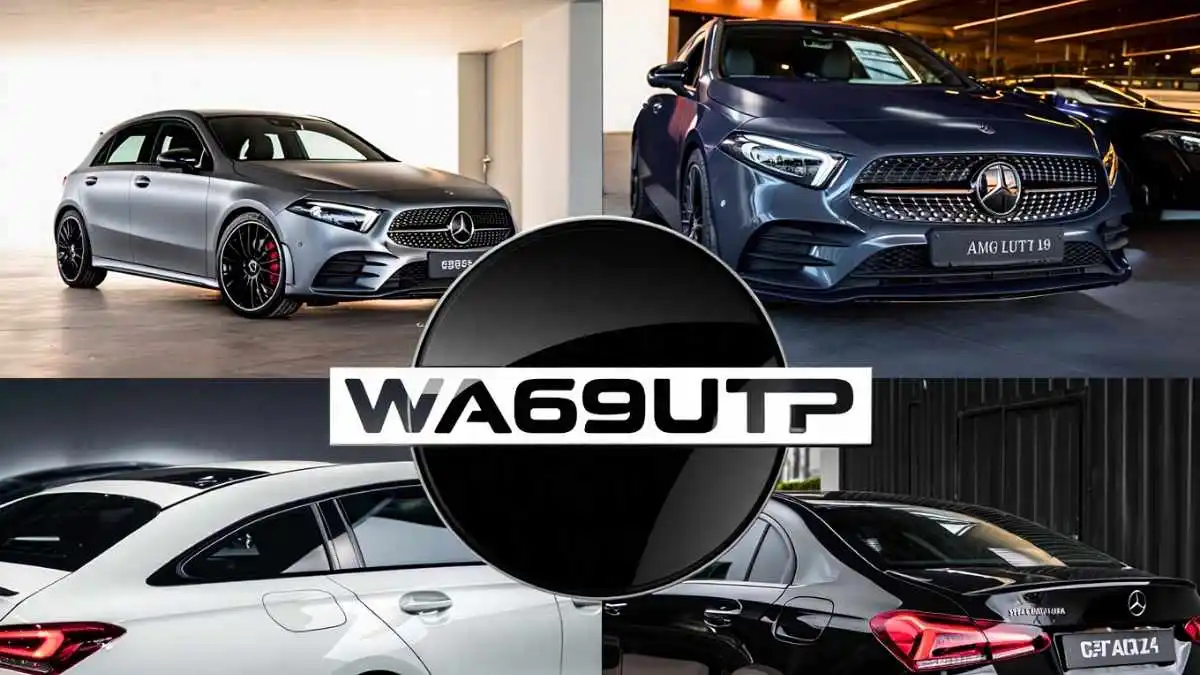Vehicle registration numbers serve as unique identifiers for cars in the United Kingdom, providing valuable information about the vehicle’s make, model, age, and compliance with environmental standards. WA69UTP is one such registration, assigned to a Mercedes-Benz A 180 AMG Line Premium + D. This car, first registered between September 2019 and February 2020, exemplifies modern automotive design that strikes a balance between performance, efficiency, and regulatory compliance.
The purpose of this article is to present a clear and factual account of WA69UTP, exploring its specifications, relevance, and broader implications within the context of vehicle regulation and ownership in the UK.
Table of Contents
What is WA69UTP?
WA69UTP is a UK vehicle registration number linked to a Mercedes-Benz A 180 AMG Line Premium + D Automatic. It is powered by a 1461 cc diesel engine, producing moderate CO₂ emissions (approximately 110 g/km). It is officially recognized as ULEZ-compliant, making it suitable for driving in London’s Ultra Low Emission Zone without incurring additional charges.
Vehicle Specifications
- Make & Model: Mercedes-Benz A 180 AMG Line Premium + D A
- Fuel Type: Diesel
- Engine Capacity: 1461 cc
- Transmission: Automatic
- CO₂ Emissions: ~110 g/km
- Tax Band: £195 annually (£107.25 for six months)
- ULEZ Compliance: Yes (meets Euro 6 standards)
Importance of WA69UTP
The relevance of WA69UTP extends beyond being just a registration number. It highlights broader aspects of vehicle regulation and environmental compliance in the UK:
- Environmental Standards: As a ULEZ-compliant vehicle, WA69UTP meets strict emission controls, reducing nitrogen oxides (NOx) and particulate matter emissions. This supports public health and aligns with sustainability goals.
- Economic Considerations: The road tax bracket (£195 annually) reflects the car’s emissions rating, providing a balance between affordability for owners and environmental accountability.
- Consumer Relevance: For buyers, knowing that a car like WA69UTP is ULEZ-exempt is crucial, especially for drivers in London and other expanding clean-air zones.
READ ALSO: Fontlu: A Smart Platform for Modern Typography Design
Current Trends and Developments
- Expansion of ULEZ: In 2023, London expanded its Ultra Low Emission Zone to cover a broader area, making ULEZ compliance a vital factor for car owners.
- Shift to Sustainable Mobility: Although diesel engines like the one in WA69UTP are Euro 6 compliant, the automotive market is steadily moving toward hybrid and electric vehicles.
- Policy Influence: The UK government has set 2035 as the target to ban the sale of new petrol and diesel cars. Vehicles such as WA69UTP represent the transitional stage between complete combustion and full electrification.
- Insurance and Resale Impact: ULEZ compliance has a positive influence on resale value, as it reduces long-term ownership costs. Non-compliant cars face penalties and declining demand.
Challenges and Considerations
Despite its compliance and modern design, it raises several considerations:
- Diesel Perceptions: The public’s perception of diesel vehicles has shifted negatively due to past controversies and the growing emphasis on electric mobility.
- Taxation Complexity: Road tax bands can change, and cars with an initial list price over £40,000 attract a premium VED surcharge. Buyers must verify these details.
- Misconceptions: Many assume all diesel cars are non-compliant with ULEZ rules. WA69UTP demonstrates that newer Euro 6 diesels can, in fact, qualify.
- Depreciation Risks: As policies tighten, diesel vehicles may depreciate more rapidly compared to their electric or hybrid counterparts.
Impact on Everyday Drivers and Urban Mobility
WA69UTP holds significant value for everyday drivers, particularly in urban areas. Its ULEZ compliance ensures that owners can drive freely in London and other expanding clean-air zones without paying additional charges, making it a practical choice for city professionals. Equipped with a relatively efficient 1461 cc diesel engine, the car offers strong fuel economy, benefiting commuters who balance both urban and motorway travel.
Beyond personal convenience, vehicles like Electric vehicle transition also influence urban planning; as more cars meet emission standards, local councils are encouraged to expand low-emission zones while investing in EV charging networks to support long-term sustainability. For families and workers, cost management is another key advantage its moderate £195 annual tax band and exemption from ULEZ fees help reduce overall ownership expenses compared to older, non-compliant petrol or diesel vehicles.
Advanced Technology and Safety Features
- MBUX Infotainment System: Offers voice control, navigation, and seamless smartphone connectivity.
- Driver Assistance: Equipped with Active Brake Assist, Attention Assist, and lane-keeping technology.
- Lighting & Convenience: Adaptive LED headlights and parking sensors enhance urban driving.
- Maneuverability: A reversing camera simplifies parking and tight-space driving.
- Occupant Safety: Multiple airbags ensure strong crash protection.
- Stability & Control: Electronic stability control provides confident handling.
FAQS
1.Does the “WA” in WA69UTP tell you where the car was registered?
Yes. The prefix “WA” indicates that the vehicle was initially registered in the Exeter DVLA region. UK plates often contain geographic identifiers that show where the car was first registered.
2. Can WA69UTP be driven outside the UK without any changes?
Yes, WA69UTP can be driven abroad with the V5C logbook and a UK identifier sticker; local emission zone rules may still apply.
3. How often does WA69UTP need an MOT test?
WA69UTP requires its first MOT after three years, followed by annual inspections to meet UK road safety and emission standards.
Conclusion
WA69UTP represents more than just a number plate. It reflects the intersection of vehicle regulation, environmental compliance, and consumer decision-making. As a Mercedes-Benz A 180 AMG Line Premium + D, it offers a balance between luxury, efficiency, and regulatory alignment. Its ULEZ compliance ensures continued usability in London’s strict clean-air zone. At the same time, its relatively low emissions and affordable tax bracket make it an appealing option for cost-conscious drivers.
However, broader industry shifts toward electrification mean that vehicles like it occupy a transitional space in the market. Understanding its context helps car owners, buyers, and policymakers evaluate its relevance today and anticipate its future trajectory.


